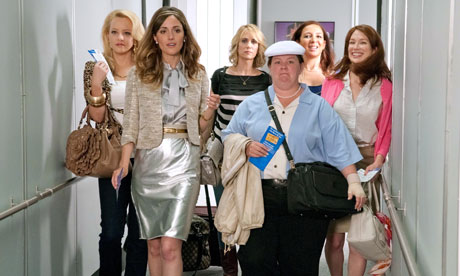
Bridesmaids has been celebrated and lambasted in equal measure – heralded as anything from a "giddy feminist manifesto" to barely approaching "quasi feminist". A great deal has been written about the film's apparent feminist credentials, somewhat undercut by the film's marketing campaign, resting heavily on the charming refrain "chick flicks don't have to suck". Jesus, it's like Save The Last Dance never happened.
Chick flicks are so readily associated with misogyny and equally written off as superficial idiot pap – it's hard to see where the sexism lies. Why are we so unwilling to scratch beneath the surface? Why should films be dismissed simply for matching a certain aesthetic? Chick flicks have a propensity of offering a countering space in which feminist ideas can quietly flourish – for every The Ugly Truth there's a Legally Blonde. Independent cinema has traditionally been a refreshing alternative to gendered depictions in chick flicks – but it is interesting when a feminist message plays out within the constraints of the genre. Contemporary films marketed to a mass female audience pivot all too often on getting a man – and there's no denying romantic narratives do well at the box office – yet there is a tradition of chick flicks subverting their customary hallmarks. Yes, Bridesmaids might be trailblazing insofar as it features Maya Rudolph crapping in a wedding dress – but the first feminist chick flick? Like, whatever.
1. Heathers
To say Bridesmaids is "the first film that has been made in my lifetime in which a woman is given a funny line", is to say you have never seen Heathers. From "Did you have a brain tumour for breakfast?" to "What's your damage, Heather?", Heathers is packed with pithy one-liners. Winona Ryder's sardonic Veronica is part of the most popular clique in school, the sadistic "Heathers", before hooking up with sociopathic dreamboat Christian Slater and accidentally seeing off her former best friend. In this treatise on peer pressure, Veronica breaks free from subjugation, first from her preconceptions of ideal femininity and then again, from her boyfriend.
2. Mean Girls
Ostensibly about a former maths impresario trying to get in with the cool girls, or "The Plastics", (essentially a more polished set of Heathers) Mean Girls sends up the imagined social hierarchy of women and the presumption that women are all bitches. Written by Bossypants herself, Tina Fey's message is that we're not bitches, we're hormonal for a while, and then we get over it.
3. Kissing Jessica Stein
Copy editor Jessica Stein, disenchanted by a series of blind dates with men, stumbles across a "women-seeking-women" personals ad quoting Rilke. Nervously pursuing her first foray into a same-sex relationship, Kissing Jessica Stein sagely observes female sexuality in a wider context than rigid sexual orientation. Featuring all the trappings of a traditional chick flick, Kissing Jessica Stein is a genuinely radical piece of filmmaking.
4. Legally Blonde
Beneath its fluffy and frivolous exterior, Legally Blonde has feminism coming out the proverbial. Protagonist Elle ditches her sorority sisters to chase her ex to Harvard law school (not feminist). The film kind of dupes us into finding Elle every bit as silly and superficial as her peers do, before revealing her whip-smart legal nous and steely sense of integrity (feminist). Notching off everything from sexual harassment to female body image, Legally Blonde is a zesty air-punch of female empowerment. Just don't mention the sequel.
5. But I'm A Cheerleader
Packaged like a designer cupcake, But I'm A Cheerleader is a visual assault of primary colours and prettiness. Natasha Lyonne stars as the most popular girl in high school, packed off to a conversion therapy camp when it is thought she might be a lesbian. Exploring themes beyond sexuality, But I'm A Cheerleader deconstructs gender identities and female stereotypes, with a little romance to warm the old heart, to boot.

